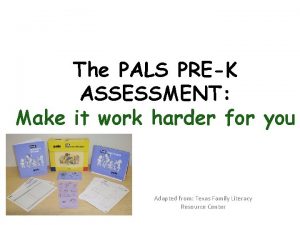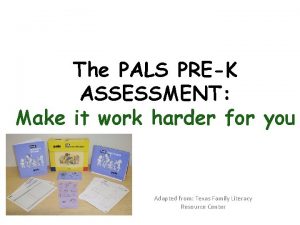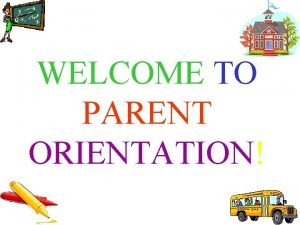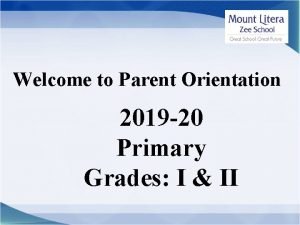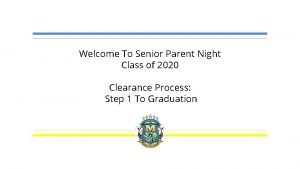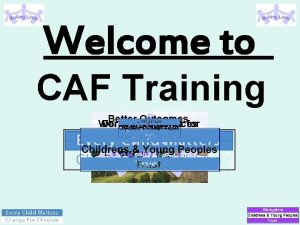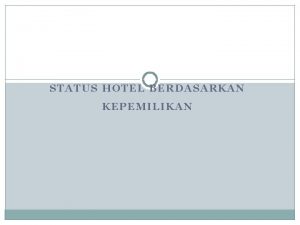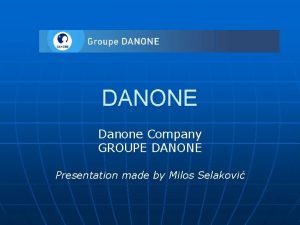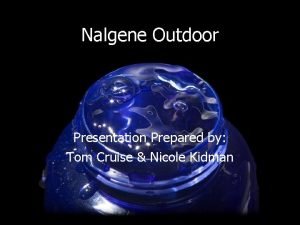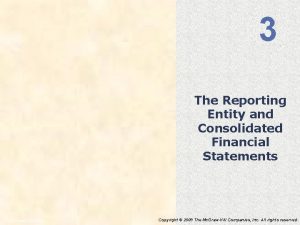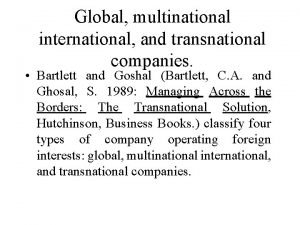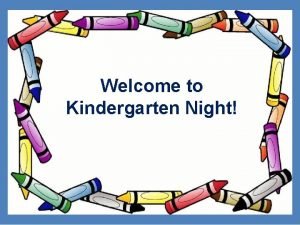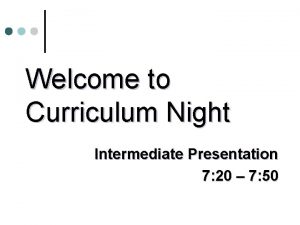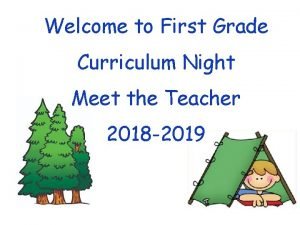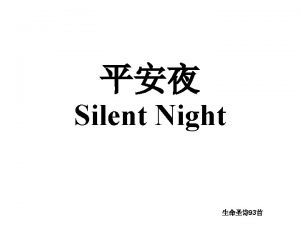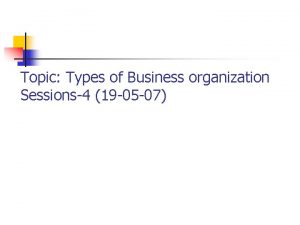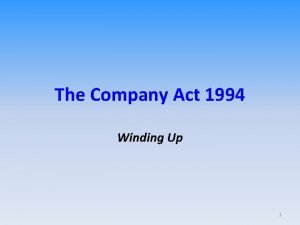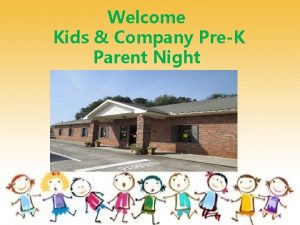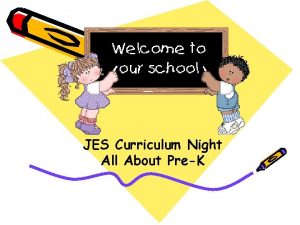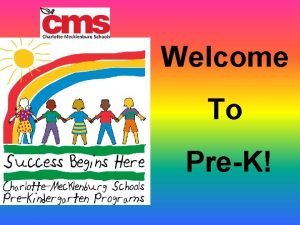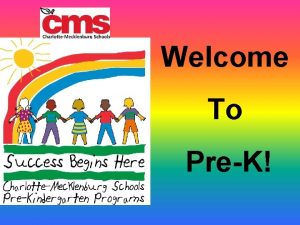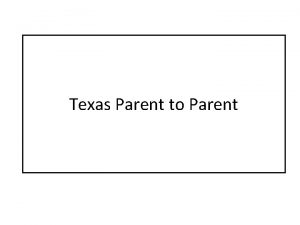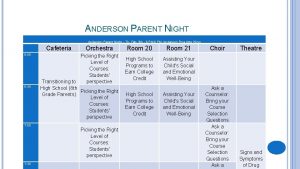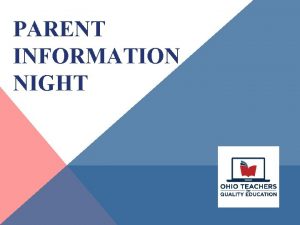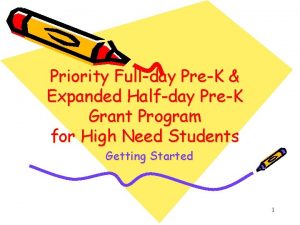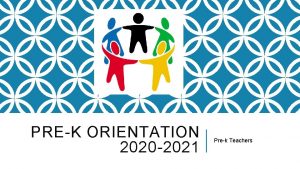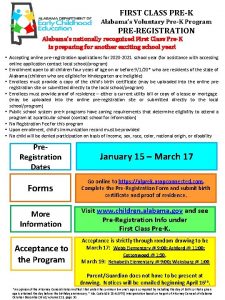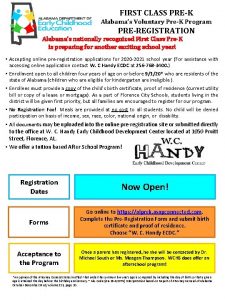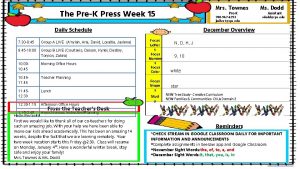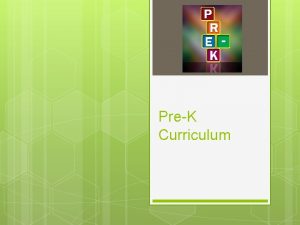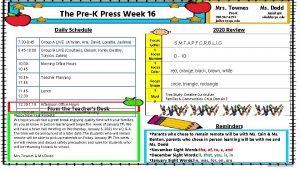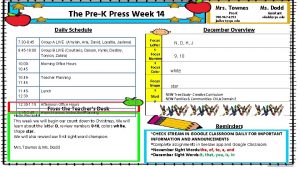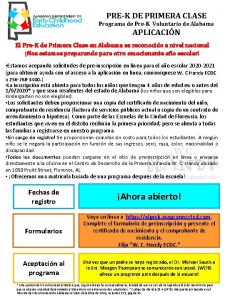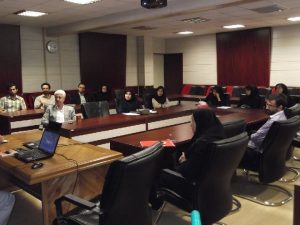Welcome Kids Company PreK Parent Night Kids and
























- Slides: 24

Welcome Kids & Company Pre-K Parent Night Kids and Company Prek 1

TONIGHT’S AGENDA 1. We would like to show you what to expect throughout your child’s school year here at Kids & Company Pre-K. 2. Give you an opportunity to ask questions about your child’s daily schedule. 3. Ways you can help your child too. 2

CLASS SCHEDULE • You should have received a copy of your child’s schedule at the beginning of the school year. If not, your teacher will be glad to give you a copy. Here is a typical day. 3

WHAT ARE? • Small groups-the class is broken down into four to five small groups so that individualized attention can be given to students. • Large groups-whole class participates in an activity centered around a theme with a pre-reading, math, and/or language component within the activity. • Centers – structured play in designated areas such as home living, construction, writing center, art center, math center, science center, reading center, and listening center. 4

HOW DO WE DETERMINE WHAT WE TEACH YOUR CHILD? • GELDS = Georgia Early Learning and Development Standards • Gelds are based on a continuum of skills, behaviors, and concepts that children develop during this stage of their lives. • The GELDS are aligned with the Head Start Child Outcome Framework, CCGPS for K-12, and the Bright from the Start Work Sampling System. • GELDS are taught through research based early learning standards which include five domains. • The Standards are found within the domains that we teach. For example: CLL 1. 4 b Listen and follow multi-step directions. 5

GELDS Gelds are broken down into 5 domains: 1. Physical Development and Motor Skills 2. Social and Emotional Development 3. Approaches to Play and Learning 4. Communication, Language and Literacy 5. Cognitive and General Development 6

DOMAIN 1: PHYSICAL DEVELOPMENT & MOTOR SKILLS • Health and well being • Use of Senses • Motor skills 7

DOMAIN 2: SOCIAL AND EMOTIONAL DEVELOPMENT • Developing a sense of self • Self-regulation • Developing a sense of self with others 8

DOMAIN 3: APPROACHES TO PLAY AND LEARNING • Initiative and exploration • Attentiveness and Persistence • Play 9

DOMAIN 4: COMMUNICATION, LANGUAGE, AND LITERACY • Receptive Language • Expressive Language • Early Reading • Early Writing 10

DOMAIN 5: COGNITIVE DEVELOPMENT AND GENERAL KNOWLEDGE INCLUDES: • MATH • Number and Quantity • Measurement and Comparison • Geometry and Spatial Thinking • Mathematical Reasoning 11

COGNITIVE DEVELOPMENT AND GENERAL KNOWLEDGE • Social Studies • Family • People and Community • History and Events 12

COGNITIVE DEVELOPMENT AND GENERAL KNOWLEDGE • Science • Scientific skills and methods • Earth and Space • Living Creatures • Physical Science 13

COGNITIVE DEVELOPMENT AND GENERAL KNOWLEDGE • Science • Interaction with environment 14

COGNITIVE DEVELOPMENT AND GENERAL KNOWLEDGE • Creative Development Strands • Creative Movement and Dance • Visual Arts • Music • Drama 15

COGNITIVE DEVELOPMENT AND GENERAL KNOWLEDGE • Cognitive Processes • Thinking skills • Problem Solving 16

INCORPORATION OF TECHNOLOGY IN THE CLASSROOM • We incorporate technology throughout our day in small group, large group, and independent work. • Your child has access to an i. Pad and interactive SMARTboard. • We use applications and games in order to teach your child through technology. 17

PROGRESS MONITORING We assess your child throughout the year in a variety of ways. -Informal assessments: We use assessment data to develop learning goals for students, to differentiate instruction for students, and to document learning. -PALS (Phonological Awareness Literacy Screening): PALS is a way for us to monitor your child’s progress in letter and sound identification, phonological awareness skills, and concepts about print. 18

MORE ON PROGRESS MONITORING We also gather data using a portfolio based system. -We collect notes through observation, matrices, photos, and work samples in order to determine your child’s understanding of specific standards and domains. 19

HOW IS MY CHILD DOING? • Your child’s teacher will meet with you twice during the school year. Expect a conference around November/December and April/May. • Communication will come in the form of newsletters, emails, and phone reminders. • Check your teacher’s website for reminders and information. • At any time, you may email your teacher and ask for a conference or find out how your child is doing. • We would love for you to visit during lunch, free centers, or to read to the class! Please email your teacher to schedule a time. 20

ATTENDANCE REMINDERS • Attendance is vital in early education for school success. • 3 tardies or early checkouts without an excuse will count as 1 unexcused absence. • Parents are only allowed to write 4 excuses for child absences per semester. • Please note: Out of district students attendance can affect admission to CPS. 21

HOW CAN I HELP AT HOME? • Read to your child nightly • Play board games • Educational websites or APPS • Check out newsletters and website and talk about what is going on in school. • Visit the Library • Talk to your child everywhere you go and ask questions. • “What do you think you do with this? ” • “Do you know what section of the grocery store the milk is in? ” 22

EDUCATIONAL APPS OR ONLINE GAMES TO USE AT HOME • Abcya. com • Epic. com • Starfall. com • Shepardsoftware. com 23

THANK YOU! We value our time with your child everyday. Thank you for coming tonight. We hope you have a better understanding of your child’s day at Cartersville Kids and Company Pre-K. 24
 Kids r kids west cobb
Kids r kids west cobb Pals prek assessment
Pals prek assessment Prek newsletter
Prek newsletter Pals-prek assessment pdf
Pals-prek assessment pdf Welcome to parent orientation
Welcome to parent orientation Welcome to parent orientation
Welcome to parent orientation Welcome speech for kindergarten parent orientation
Welcome speech for kindergarten parent orientation Georgiacreditrecovery
Georgiacreditrecovery Fsa parent night
Fsa parent night Welcome to kids caf
Welcome to kids caf Apa itu independent hotel
Apa itu independent hotel Danone introduction
Danone introduction Nalgene parent company
Nalgene parent company When was kfc founded
When was kfc founded Incomparent
Incomparent What is subsidiary and holding company
What is subsidiary and holding company Transnational multinational global international
Transnational multinational global international Wise men three clever are we
Wise men three clever are we Welcome to kindergarten night
Welcome to kindergarten night Welcome to curriculum night
Welcome to curriculum night Welcome to curriculum night
Welcome to curriculum night Fire in night by elie wiesel
Fire in night by elie wiesel Silent night holy night all is calm all is bright
Silent night holy night all is calm all is bright Limited company vs partnership
Limited company vs partnership Winding up vs liquidation
Winding up vs liquidation

